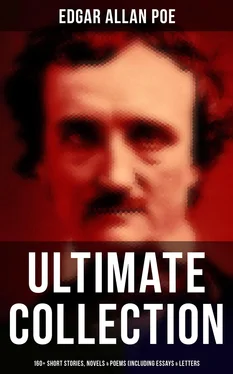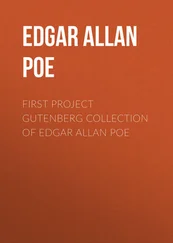“I wish you to bear especially in mind that I have spoken of a very unusual degree of activity as requisite to success in so hazardous and so difficult a feat. It is my design to show you, first, that the thing might possibly have been accomplished:— but, secondly and chiefly, I wish to impress upon your understanding the very extraordinary — the almost praeternatural character of that agility which could have accomplished it.
“You will say, no doubt, using the language of the law, that ‘to make out my case’ I should rather undervalue, than insist upon a full estimation of the activity required in this matter. This may be the practice in law, but it is not the usage of reason. My ultimate object is only the truth. My immediate purpose is to lead you to place in juxta-position that very unusual activity of which I have just spoken, with that very peculiar shrill (or harsh) and unequal voice, about whose nationality no two persons could be found to agree, and in whose utterance no syllabification could be detected.”
At these words a vague and half-formed conception of the meaning of Dupin flitted over my mind. I seemed to be upon the verge of comprehension, without power to comprehend — as men, at times, find themselves upon the brink of remembrance, without being able, in the end, to remember. My friend went on with his discourse.
“You will see,” he said, “that I have shifted the question from the mode of egress to that of ingress. It was my design to suggest that both were effected in the same manner, at the same point. Let us now revert to the interior of the room. Let us survey the appearances here. The drawers of the bureau, it is said, had been rifled, although many articles of apparel still remained within them. The conclusion here is absurd. It is a mere guess — a very silly one — and no more. How are we to know that the articles found in the drawers were not all these drawers had originally contained? Madame L’Espanaye and her daughter lived an exceedingly retired life — saw no company — seldom went out — had little use for numerous changes of habiliment. Those found were at least of as good quality as any likely to be possessed by these ladies. If a thief had taken any, why did he not take the best — why did he not take all? In a word, why did he abandon four thousand francs in gold to encumber himself with a bundle of linen? The gold was abandoned. Nearly the whole sum mentioned by Monsieur Mignaud, the banker, was discovered, in bags, upon the floor. I wish you, therefore, to discard from your thoughts the blundering idea of motive, engendered in the brains of the police by that portion of the evidence which speaks of money delivered at the door of the house. Coincidences ten times as remarkable as this (the delivery of the money, and murder committed within three days upon the party receiving it), happen to all of us every hour of our lives, without attracting even momentary notice. Coincidences, in general, are great stumbling-blocks in the way of that class of thinkers who have been educated to know nothing of the theory of probabilities — that theory to which the most glorious objects of human research are indebted for the most glorious of illustration. In the present instance, had the gold been gone, the fact of its delivery three days before would have formed something more than a coincidence. It would have been corroborative of this idea of motive. But, under the real circumstances of the case, if we are to suppose gold the motive of this outrage, we must also imagine the perpetrator so vacillating an idiot as to have abandoned his gold and his motive together.
“Keeping now steadily in mind the points to which I have drawn your attention — that peculiar voice, that unusual agility, and that startling absence of motive in a murder so singularly atrocious as this — let us glance at the butchery itself. Here is a woman strangled to death by manual strength, and thrust up a chimney, head downward. Ordinary assassins employ no such modes of murder as this. Least of all, do they thus dispose of the murdered. In the manner of thrusting the corpse up the chimney, you will that there was something excessively outre — something altogether irreconcilable with our common notions of human action, even when we suppose the actors the most depraved of men. Think, too, how great must have been that strength which could have thrust the body up such an aperture so forcibly that the united vigor of several persons was found barely sufficient to drag it down!
“Turn, now, to other indications of the employment of a vigor most marvellous. On the hearth were thick tresses — very thick tresses — of grey human hair. These had been torn out by the roots. You are aware of the great force necessary in tearing thus from the head even twenty or thirty hairs together. You saw the locks in question as well as myself. Their roots (a hideous sight!) were clotted with fragments of the flesh of the scalp — sure token of the prodigious power which had been exerted in uprooting perhaps half a million of hairs at a time. The throat of the old lady was not merely cut, but the head absolutely severed from the body: the instrument was a mere razor. I wish you also to look at the brutal ferocity of these deeds. Of the bruises upon the body of Madame L’Espanaye I do not speak. Monsieur Dumas, and his worthy coadjutor Monsieur Etienne, have pronounced that they were inflicted by some obtuse instrument; and so far these gentlemen are very correct. The obtuse instrument was clearly the stone pavement in the yard, upon which the victim had fallen from the window which looked in upon the bed. This idea, however simple it may now seem, escaped the police for the same reason that the breadth of the shutters escaped them — because, by the affair of the nails, their perceptions had been hermetically sealed against the possibility of the windows have ever been opened at all.
If now, in addition to all these things, you have properly reflected upon the odd disorder of the chamber, we have gone so far as to combine the ideas of an agility astounding, a strength superhuman, a ferocity brutal, a butchery without motive, a grotesquerie in horror absolutely alien from humanity, and a voice foreign in tone to the ears of men of many nations, and devoid of all distinct or intelligible syllabification. What result, then, has ensued? What impression have I made upon your fancy?”
I felt a creeping of the flesh as Dupin asked me the question. “A madman,” I said, “has done this deed — some raving maniac, escaped from a neighboring Maison de Sante.”
“In some respects,” he replied, “your idea is not irrelevant. But the voices of madmen, even in their wildest paroxysms, are never found to tally with that peculiar voice heard upon the stairs. Madmen are of some nation, and their language, however incoherent in its words, has always the coherence of syllabification. Besides, the hair of a madman is not such as I now hold in my hand. I disentangled this little tuft from the rigidly clutched fingers of Madame L’Espanaye. Tell me what you can make of it.”
“Dupin!” I said, completely unnerved; “this hair is most unusual — this is no human hair.”
“I have not asserted that it is,” said he; “but, before we decide this point, I wish you to glance at the little sketch I have here traced upon this paper. It is a fac-simile drawing of what has been described in one portion of the testimony as ‘dark bruises, and deep indentations of finger nails,’ upon the throat of Mademoiselle L’Espanaye, and in another, (by Messrs. Dumas and Etienne,) as a ‘series of livid spots, evidently the impression of fingers.’
“You will perceive,” continued my friend, spreading out the paper upon the table before us, “that this drawing gives the idea of a firm and fixed hold. There is no slipping apparent. Each finger has retained — possibly until the death of the victim — the fearful grasp by which it originally imbedded itself. Attempt, now, to place all your fingers, at the same time, in the respective impressions as you see them.”
Читать дальше












